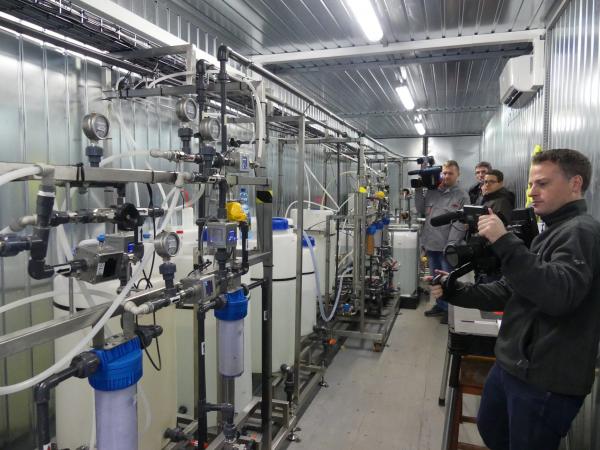ZERO BRINE: Extracting Value From Europe's Industrial Wastewater
Four Projects Seek To Reduce Water Pollution Through Circular Transition
26 May 2021 by The Water Diplomat
Brussels, Belgium

An EU-funded project is seeking to transform industrial wastewater into economic and environmental value by extracting minerals and freshwater from brine as part of circular transitions in four distinct industries.
Pilot projects run by ZERO BRINE in the Netherlands, Poland, Spain and Turkey aim to prove processes that will eliminate disposal of harmful wastewater produced by the desalination, coal, silica and textiles industries respectively, while generating economic opportunities.
"ZERO BRINE is about a circular economy approach for the recovery of resources from saline-impaired effluent generated by process industries," explained Dr. Dimitris Xevgenos, Innovation Manager for ZERO BRINE, speaking at a press briefing and public live stream event as part of EU Green Week.
At the ZERO BRINE pilot project in Zaragoza (Spain), which produces precipitated silica for the tyre industry, more than 70% of water is being water recycling internally, said Dr. Xevgenos, while the sodium sulphate recovered from the effluent can be sold on to other end markets such as the detergent sector.
Describing the "window of opportunity" for the circular transition in the silica sector, Dr. Xevgenos highlighted policy developments such as the BREF update (JRC), new Zero Pollution Action Plan, EU Green Deal and Sustainable & Safe by Design (SSbD) as well as legislative restrictions on wastewater discharge.
Dr. Selda Murat Hocaoglu from the TUBITAK Marmara Research Institute in Turkey, outlined a closed-loop process at the Zorlu textile plant in Lueleburgaz (Turkey) that separates the "highly polluted brine" produced during the water-intensive textile dyeing process into freshwater and salt concentrates, both of which then feed back into the dyeing process.
"(The brine) can have serious environmental and ecological impacts, especially for the inland receiving water bodies such as lakes and rivers," said Dr. Hocaoglu. "This can cause salinisation of the soil, which is one of the most severe environmental problems in agriculture," she added.
ZERO BRINE is a four-year, €10 Million EUR Innovation Action project financed by the European Commission’s research and innovation programme - Horizon 2020 - and coordinated by TU DELFT.
Watch the full webinar here.
Photo credit: ZERO BRINE
- Pollution & Contamination
- Environment & Ecosystems
- Innovation, Infrastructure & Technology
- Europe
- Turkey
- Spain
- Poland
- Netherlands
- Europe
- Zaragoza
- ZERO BRINE
- Industrial wastewater treatment
- Pollution
- EU Green Week
- Dr. Panagiotis Balabanis
- Dr. Dimitris Xevgenos
- Dr. Selda Murat Hocaoglu
- Circular Economy
- Wastewater
